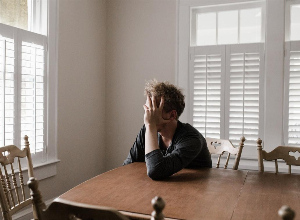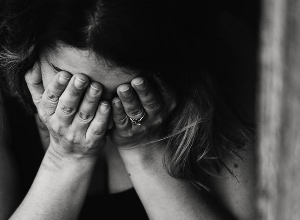Mental health: How to Better Cope with Self-Isolation?
Published 17 Apr 2020 • Updated 20 Apr 2020 • By Camille Dauvergne
Approximately one in four people in the UK are affected by mental illness, be it depression, bipolar disorder, schizophrenia or anxiety. The current situation can be very difficult for these people, who can be much more sensitive to isolation and anxiety than the rest of the population.
How can we avoid worsening one's mental illness? How can we help an isolated relative with a mental illness? We tell you everything!

I have a mental illness. Is there a risk it could get worse with self-isolation?
According to Dr. Jean-Victor Blanc, a psychiatrist at the Saint-Antoine Hospital in Paris, patients with mental disorders are much more sensitive to situations of isolation such as the one we are currently experiencing, as well as to the anxiety-provoking atmosphere fuelled by the continuous flow of information.
Dr. Blanc points out that many of his patients are afraid of having another depressive episode or stress-related reactions during self-isolation. He has also observed a form of self-censorship, where patients completely prevent themselves from going outside, for example, even though one form of physical activity per day outdoors is allowed. This is often accompanied by a lack of motivation or poor compliance with treatment (failure to respect the doctor's prescription), which can lead to mental crisis(decompensation) if the right reflexes are not adopted!
Are patients with mental illness more vulnerable to COVID-19?
According to Professor Pierre-Michel Llorca, head of the psychiatry department at the Clermont-Ferrand University Hospital and member of the board of directors of the FondaMental foundation, patients with mental illnesses are vulnerable in this period of health crisis for several reasons:
- People affected by mental illness often have other chronic pathologies such as obesity, hypertension or diabetes (1.5 to 2 times more than the general population). These illnesses are risk factors for the development of severe complications in case of COVID-19.
- Mental health patients often have more difficulty applying barrier gestures and respecting the isolation. Indeed, these measures require hyper vigilance. Some patients have cognitive difficulties when planning their actions, and their illnesses impair how they plan their actions. Their attention can become lax. This is the case, for example, for people with autism, schizophrenia or bipolar disorder.
- Some patients "don't realise the necessity of these gestures," says Pierre-Michel Llorca. "When you are very depressed, you sometimes cannot take care of your hygiene. You just cannot manage to take care of yourself at all." In this case, it is very difficult to follow the barrier gestures, which exposes patients to the coronavirus even more.
Is there any advice on how to avoid a "relapse " of my mental illness?
According to Dr. Blanc, it is particularly important to:
- continue to take your medication correctly in the long term: indeed, if you fail to take it, or take it incorrectly, this considerably increases the risk of destabilising your mental state, and can lead to stress reactions, a marked depressive episode or acute delirium requiring emergency hospitalisation.
- maintain a close therapeutic link with your doctor (psychiatrist, psychologist, etc.): teleconsultation will allow you to continue to exchange with your doctor, who will regularly assess your mental state, your habits, your compliance with medication, the effects of medication, etc. It is very important to keep this link, and especially not to isolate yourself further! If you are unable to have a teleconsultation, talk to your doctor about conducting your appointment by phone.
- maintain a daily routine: Usually days are punctuated by waking time, meal times, social times and bedtime. Without going as far as a military schedule, it is very important to keep these activities on a regular time schedule!
For example: get up at the same time every day, take the time to get dressed, prepare your meals and eat at the table, call your family and friends if you are alone, go out for a walk for at least 20 minutes (yes, you are allowed to go out), do something you enjoy, and go to bed at a regular time.
Keeping busy and setting the pace of your day will help you avoid that feeling of endless time, which can lead to decreased motivation and increased stress.
I'm afraid for the mental health of a relative in self-isolation, what can I do to help?
It is especially important to take care of your isolated relatives with mental illness. Don't hesitate to call them every day or at least several times a week to check up on them! Check that they are taking their medication properly and that they are maintaining a healthy lifestyle (sleep, meals, physical activity). Show them that they are not alone, and that they can also contact their doctor if they do not feel well!
SANE provides emotional support, information and guidance for people affected by mental illness, their families and carers. You can reach out to them via:
- SANEline number: 07984 967 708 - leave a message giving your first name and a contact number and a professional will call you back.
- Email: support@sane.org.uk
- Textcare: comfort and care via text message - www.sane.org.uk/textcare
- Peer support forum: www.sane.org.uk/supportforum
Can I develop a mental illness during isolation?
In an article published March 14th in the scientific journal The Lancet, seven members of the Department of Psychological
Medicine at King's College London warn: "The potential benefits of mandatory mass quarantine need to be weighed carefully against
the possible psychological costs." Although they recognise the usefulness of isolation in the containment of the coronavirus, they warn of the need for the authorities keep the population informed as well as possible and to ensure the continuity of basic services throughout the duration of the isolation, at the risk of increasing the psychological consequences on the population during and after isolation.
Neil Greenberg, one of the authors of the article, states that “The most vulnerable people will be those who already have a history and this may tip others over who were not at their best - hence the importance of looking out for each other”.
In China, researchers at the Shanghai Mental Health Centre interviewed nearly 53,000 people via an online questionnaire between January 31 and February 10, during the height of the COVID-19 epidemic. According to the results of the first national survey, published on 6 March in General Psychiatry, "nearly 35% of respondents suffered some form of psychological distress".
To reduce the risk of developing a form of anxiety and the symptoms accompanying it, stay informed with reliable sources, stay socially active even at a distance and keep a healthy lifestyle (routine, diet, physical activity).
Do not hesitate to contact your doctor if you experience symptoms of mental distress (fatigue and loss of energy, change in weight or appetite, excessive sleep or difficulty falling asleep, increased tension and anxiety, decreased activity level, decreased self-esteem or feelings of guilt, trouble thinking or concentrating, or suicidal thoughts).
Can I do a teleconsultation with a psychiatrist if I'm not already being seen?
Seeing a psychiatrist for the first time in a teleconsultation is more difficult than consulting a psychiatrist while you are already being treated, however several solutions exist:
- For free 24-hour listening support, call Samaritans free on 116 123 or visit the Samaritans website. You can also texts "SHOUT" to 85258 or visit the Shout Crisis Text Line
- In England and Wales, contact Mind, a mental health charity, at their infoline for information on mental health issues, where to get help near you, treatment options, or advocacy services: 0300 123 3393
- Platforms offering teleconsultation with psychiatrists and psychologists such as Psychiatry-UK, BetterHelp, JustAnswer, etc.
Can modifying my lifestyle reduce the effectiveness of my treatments?
The decrease in physical activity caused by isolation will not affect the effectiveness of your treatments. However, the stress and anxiety resulting from the current situation can lead to behaviours that decrease their absorption and therefore the effectiveness of your medications. Among them, the main ones are alcohol consumption and smoking, which should therefore be avoided if you are taking treatments for your mental illness (neuroleptics, antidepressants, anti-anxiety).
The risk of drug interaction is high and can lead to a significant destabilisation of your condition, to dangerous behaviour for yourself and those around you, or even to life-threatening emergencies (particularly with alcohol).
Is there a risk of a shortage of psychoactive drugs?
For the time being, there is no risk of a shortage of psychoactive drugs and other treatments for mental illness. These medications are not being used in the treatment of COVID-19, so demand is stable and stocks are available.
How do I find support on Carenity?
Today, Carenity has thousands of patients and relatives of patients with mental illness. On the platform, you can find support from other members of the community. It is important that we help each other, especially in this difficult time of the COVID-19 pandemic. Join the ongoing discussions today!
- Mental illness and self-isolation - How are you doing?
- Living with Depression - Are you worried about the Coronavirus?
- Coronavirus: How to keep busy while self-isolating?
- Today I feel... A coronavirus special!
Who to contact in case of a mental health emergency?
In addition to the resources mentioned above, here is a list of specialist services that provide various treatments, including counselling and other talking services:
Mental health helplines:
Charity providing support if you have been diagnosed with an anxiety condition.
A charity helping people living with manic depression or bipolar disorder.
Mental Health Foundation - www.mentalhealth.org.uk
Provides information and support for anyone with mental health problems or learning disabilities.
Sources :
- https://www.mind.org.uk/information-support/types-of-mental-health-problems/statistics-and-facts-about-mental-health/how-common-are-mental-health-problems/
- Emission Allô Docteurs
- https://www.has-sante.fr/jcms/p_3168631/fr/prise-en-charge-des-patients-souffrant-de-pathologies-psychiatriques-en-situation-de-confinement-a-leur-domicile
- https://www.lepoint.fr/sante/confinement-une-ligne-d-ecoute-psychologique-ouverte-a-tous-05-04-2020-2370149_40.php#
- https://france3-regions.francetvinfo.fr/auvergne-rhone-alpes/puy-de-dome/clermont-ferrand/coronavirus-covid-19-malades-psychiatriques-ces-oublies-crise-1813758.html
- https://www.thelancet.com/journals/lancet/article/PIIS0140-6736(20)30460-8/fulltext#%20
- https://www.gov.uk/government/publications/covid-19-guidance-for-the-public-on-mental-health-and-wellbeing/guidance-for-the-public-on-the-mental-health-and-wellbeing-aspects-of-coronavirus-covid-19
- https://www.nhs.uk/oneyou/every-mind-matters/urgent-support/
- https://www.nhs.uk/conditions/stress-anxiety-depression/mental-health-helplines/

 Facebook
Facebook Twitter
Twitter



